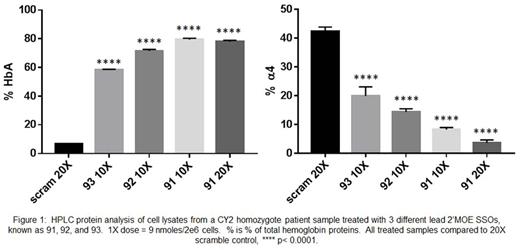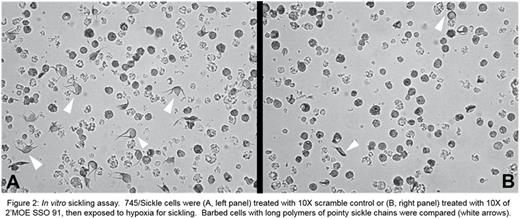Abstract
Hemoglobinopathies are the most common inherited blood disorders. World Health Organization statistics show that in the Mediterranean, Eastern European, and Middle Eastern regions, frequencies range from 0.1 to 4.9/1000 of live births. The mutation known as IVS2-745 is relatively common in the regions of Spain, Jordan, Romania, and Serbia (Ithanet Database, http://www.ithanet.eu/db/ithamaps), reaching as high as 15-20% of beta-thalassemia mutations in these regions. The IVS2-745 is a splicing mutation that occurs in intron 2 of the beta-globin gene and results in an aberrantly spliced mRNA that incorporates an extra exon and premature stop codon. Here we report novel uniform 2'-O-methoxyethyl (2'-MOE) splice switching oligos (SSOs) that reverse the aberrant splicing and restore up to 80% adult hemoglobin (HbA) production in vitro.
Uniform 2'-MOE SSOs do not mediate RNase H degradation when they bind their targets; therefore, they can be used to redirect the splicing machinery and restore WT splicing. After generating mouse erythroleukemia cells that carry the human IVS2-745 mutated beta-globin gene, lead 2'-MOE SSOs targeting the 745 mRNA were raised against these cell lines. With these lead SSOs we have demonstrated aberrant 745 to WT splice switching in 5 patient samples. CD34+ cells were isolated from the blood of four 745/β0 compound heterozygotes and one 745/ 745 homozygote (Breda et al, PloS One 2012). After CD34+ expansion, cells were differentiated to the red cell lineage and treated via syringe loading or lipofectamine transfection with 2'-MOE SSOs. Up to 80% HbA protein production was restored with 2'MOE-SSO treatment in the 745 homozygote patient sample (Figure 1), and up to 60% HbA in multiple 745 compound heterozygote specimens. Compared to 3-6% HbA in scramble treated controls, this represents up to a 20-fold increase in HbA with treatment.
In addition to HbA production, we have shown improvement in other parameters characteristic in beta-thalassemia, such as the imbalance of alpha and beta chains and the accumulation of toxic alpha-only homotetramers. 2'MOE SSOs are able to reinstate balance of beta- to alpha-like chains, which resulted in a near elimination of toxic alpha-only homotetramers in the homozygote cell lysate as detected by HPLC (Figure 1). We further proved the benefit of 2'MOE SSOs in a 745/Sickle model system, where in vitro sickling was significantly reduced as a result of increased levels of HbA. To create this model system, we transduced CD34+ cells from a homozygous sickle patient specimen with a lentivirus expressing human IVS2-745 beta-globin. With vector copy numbers ~2, this system replicates what a single allele would do, as the 2 endogenous sickle alleles are equally matched. Upon differentiation and exposure to hypoxia, in vitro sickling was reduced by 50% in 2'MOE-SSO treated samples as compared to scramble controls (Figure 2).
In summary, 2'MOE-SSOs are a promising therapy for certain splicing forms of beta-thalassemia. Their ability to correct the underlying splicing cause offers a pharmacological treatment that is both direct and specific. As such, this therapy could help patients reduce their transfusion dependence or even reach transfusion independence.
Guo:Ionis Pharmaceuticals: Employment, Equity Ownership. Peralta:Ionis Pharmacueticals: Employment. Cappellini:Celgene: Membership on an entity's Board of Directors or advisory committees; Genzyme-Sanofi: Membership on an entity's Board of Directors or advisory committees; Novartis: Membership on an entity's Board of Directors or advisory committees.
Author notes
Asterisk with author names denotes non-ASH members.



This feature is available to Subscribers Only
Sign In or Create an Account Close Modal